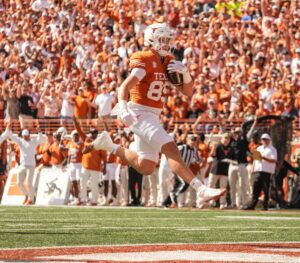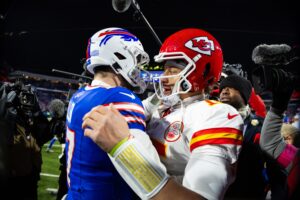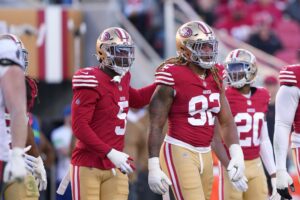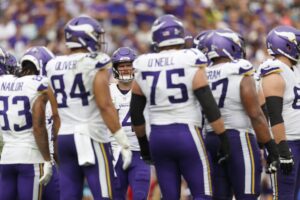Once the Philadelphia Eagles worked their way through their mysterious starting-quarterback maze, perhaps hoping to produce enough smoke to confuse the Atlanta Falcons, only one question remained. Having only practiced together, could the defending Super Bowl champs take on a pretty strong opponent in their opener and win? Only some of their strongest core players had faced people in hostile uniforms all summer, and most had faced them only briefly or ineptly. Jay Ajayi was one, however, not in the inept category.
Philadelphia Eagles Led by Nick Foles Win in Predictable, Surprising Way
Philly named their starting quarterback only three days before the opener, and four significant core members of the team – Jason Peters, Darren Sproles, Nelson Agholor, and Jordan Hicks – had not been near a football snapped in actual competition in months.
The starting quarterback for the Eagles in their season opener was Super Bowl MVP Nick Foles. The first clue Foles would probably start came during the last preseason game against the New York Jets. Only the fourth and fifth-string quarterbacks, both players the Eagles cut, played. Even third-stringer Nate Sudfeld was completely protected.
A day before game day the press indicated that receivers Alshon Jeffery and Mack Hollins would not be unavailable, and that Carson Wentz had not been medically cleared. It was arguably irresponsible to consider even dressing Wentz and equally hard to imagine a physician clearing him with less than 36 hours until game time.
Wide receiver Markus Wheaton, who missed the 53-man cut, was put back into the mix.
Game Day Keys
Thursday evening there was a very noisy ceremony as the Eagles hung their Super Bowl banner, and then the season began.
Foles took the first offensive snap for Philadelphia after Atlanta sputtered when the Eagles deferred on the first kickoff. His performance was rightly expected to be a key to the game, which meant that the performance of his offensive line was also vital. When scrambling, Foles resembles the Tin Man in The Wizard of Oz. He needs protection.
Another key to the contest seemed likely to be the performance of the Eagles defensive line against Atlanta’s running game. The day before on sports talk station WIP in Philly, Sheil Kapadia of The Athletic had said it was unfortunate for the Eagles that linebacker Nigel Bradham was suspended for the opening game. The Falcons run a lot of “old-fashioned,” two-back sets and would present a threat with Devonta Freeman and Tevin Coleman, Kapadia believed.
However, the Eagles were the league’s best against the run in 2017, allowing only 79.2 yards a game. That wasn’t Bradham alone. Everyone on the field knew the leaders of the Eagles D-Pack are tackle Fletcher Cox and safety Malcolm Jenkins, and both were available. Cox had been more than a handful for the Falcons in their playoff game with the Eagles last winter.
At the game’s end, both aspects had been important, but not entirely deciding in the 18-12 Philadelphia win. The Eagles held Freeman and Coleman together to 55 yards rushing and Atlanta to 74 yards overall on the ground. Foles completed 19 of 34 passes for 117 yards, but had no touchdowns and one interception.
Unsurprising Surprises
When all was said and done, the expectations of analysts were somewhat off because Atlanta leaned heavily on the pass, and specifically on throwing to their star receiver Julio Jones.
At the very end of the game, Falcons quarterback Matt Ryan could not connect with Jones in the end zone, which was very reminiscent of their failed connection at the end of their playoff game last winter. Jones actually caught the pass Thursday night, but Eagles cornerback Ronald Darby had maneuvered him out of bounds. Ryan’s pass was the last of nine intended for Jones that didn’t connect legally. The wide receiver caught ten balls, however, for 169 yards, which is impressive, but his team lost.
The Eagles big offensive moment came a bit earlier in the fourth quarter, before Ajayi’s second and game-deciding touchdown on an 11-yard run. Foles was central to the play, but not in a way anyone really believed would happen. No one really expected the Eagles to come up with a play that will probably be called Philly Special 2.0, let alone in a key third-and-five situation late in the game, but that’s what they did.
The play was not an exact copy of the pivotal play in Super Bowl LII, when Foles caught a touchdown pass from tight end Trey Burton, but it was close enough, and once again Foles caught the pass, this time for 15 yards in Atlanta territory. The ball was thrown this time by Agholor, who was seemingly running an end-around route and took a pitch from running back Corey Clement. As in February, Foles had run right after giving up the ball in the backfield.
If there is one play in Philadelphia Eagles history that might be predictable at any point in any game now, it is a trick play involving their quarterback catching a short pass to the right. However, the Falcons didn’t seem to expect it in that situation, and it is likely that no one else watching did either.
Main Photo






